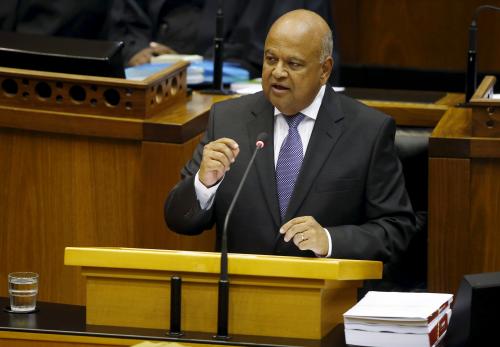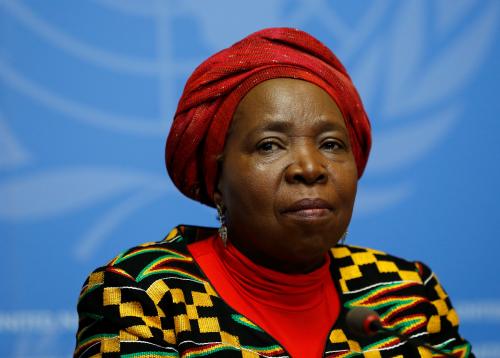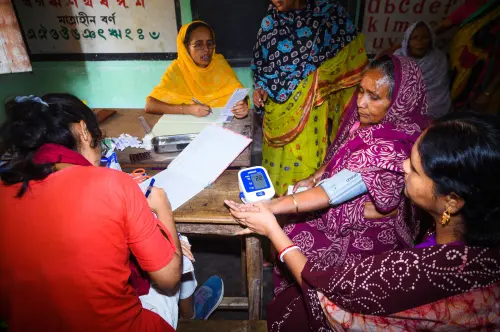U.S. Secretary of State John Kerry’s visit to Nigeria coincides with reports of Boko Haram leader’s death and President Muhammadu Buhari’s “War Against Indiscipline”
On Monday, Secretary Kerry headed to sub-Saharan Africa for discussions on security in the region. After a stop in Kenya, he flew to Nigeria to meet with President Buhari regarding the Boko Haram threat in the north of the country. As Kerry arrived in Nigeria, the government announced that it had “fatally wounded” Boko Haram leader Abubakar Shekau in an air attack. Some analysts are doubtful, as the Nigerian army has falsely claimed to have killed him before. Boko Haram’s leadership has been in question in recent weeks as ISIS has declared a new leader of the terrorist group, but Shekau came out from his long silence to declare that he was still in charge. A goal for Buhari during Kerry’s visit was to persuade the United States to sell aircraft to the Nigerian government again—the U.S. had halted these sales due to the former president’s rocky human rights record. Then new administration maintains that it has improved the human rights record enough to warrant arms sales again.
Also this week, Buhari revived his “War Against Indiscipline,” an effort he had started as the country’s military leader in 1984. Faced with low commodity prices and an increasingly unstable economy, the president looks to re-implement the program, under which “…Nigerians faced physical punishment—even imprisonment—for such misdemeanors as queueing improperly or being late for work,” according to the Financial Times. The decision is very controversial: According to the Times, “[F]or many, the 73-year-old’s decision to revert to an old and largely unpopular tactic exacerbated the sense of a leader out of touch and faltering as he attempts to turnround [sic] a nation enduring its worst economic crisis in years.” In addition, the War Against Indiscipline enforcement brigades—of which the administration expects 17,000 volunteers—in the past were often corrupt themselves, having taken bribes and “infantilized, traumatized, and dehumanized Nigerians.”
Protests erupt in Zimbabwe over unpaid wages and hiring freezes
Through the week, a series of anti-Mugabe protests have erupted throughout Zimbabwe. Demonstrators have been asking for imminent political reform to be implemented in preparation for the 2018 general elections. Wednesday, protests continued as young members of the opposition party took to the streets, denouncing the unjust abuse of power against protestors recently committed by the Zimbabwean police. The police are being accused of using forceful tools to dissipate the protesters who have been calling for President Mugabe to step down. The police have denied the claims of brutality and have accused the opposition of using “hooligans” to attack police officers. Still, reports state that the police continue to fire warning shots and use tear gas and water cannons to disperse demonstrators. The protests have spilled over into the neighboring country of South Africa as Zimbabwean nationals marched in Port Elizabeth on Saturday, demanding Mugabe’s resignation and calling out his responsibility in perpetrating starvation and unemployment.
In addition to political and security issues, Zimbabwe is also faced with great economic woes. The El Nino-induced drought has taken a toll on Zimbabwe’s economy, as it greatly reduced agricultural revenues. Amid the increased financial issues, the Zimbabwean government has halted the hiring of state employees as it struggles to pay for the wages of federal employees. In early July, government employees staged a strike to protests the late payments. This week, the Mugabe administration announced the cutting of 8000 agricultural jobs amid the shortage of fund to pay wages.
South Africa’s Finance Minister Gordhan’s potential arrest and upcoming beverage tax threaten economy while new FDI flows from the U.S. and China
South African Finance Minister Pravin Gordhan has been called to report to the special police unit, the “Hawks,” to receive a “warning statement,” which is given to suspects before they are charged with an offense. Rumors of Gordhan’s potential arrest first arose in May amid heavy accusations of setting up the South African Revenue Service’s National Research Group to spy on politicians. The minister has stated that, under legal advice that the charges are unfounded, he will not be complying with the request. This uncertainty is rocking the already unsteady economy: According to the BBC, South Africa’s projected 2016 GDP growth rate of 0.5 percent will probably be closer to zero. The rand has already fallen 4 percent and benchmark government bond yields have surged since Tuesday. If an arrest is made, analysts are speculating future dramatic declines in the rand, a downgrade of the countries credit rating to junk, and further increases in volatility and yields on government bonds.
South Africa faces another tough economic test this week as the beverage industry intensifies its fight against a sugar-sweetened drink tax Gordhan has proposed. As it stands, the 20 percent tax will take effect on April 1, 2017, and is expected to generate $813 million in government revenue. However, according to Phil Gutsche, chairman of Coca-Cola Beverages, the proposed tax could lead to the loss of 60,000 jobs—a major problem in a country where the industry employs 200,000 people and which faces an unemployment rate above 26 percent.
In spite of the recent market shocks, South Africa’s automotive-manufacturing industry remains a bright spot. The local automobile producers’ group claims the industry is capable of boosting production by 50 percent by 2020, helped by new investment from a Chinese state-owned car manufacturing company. Beijing Automotive International Corp. will invest $819 million in a new plant, signing the deal with the Coega Development Corp., operator of an industrial development zone in Port Elizabeth, South Africa.
Meanwhile, GE’s new Africa Innovation Center launched in Johannesburg, South Africa ($32 million investment) proves investment is also flowing into less conventional sectors of the economy. The center has begun to gain attention with its goal of developing African solutions to African challenges through collaboration with local customers and businesses, as well as from its virtual connection to the GE Healthcare Institute in Nairobi currently under development. The center will also house the Londvolota Enterprise Development company, a company attempting to equip small and medium enterprises with access to the GE value chain.
The Brookings Institution is committed to quality, independence, and impact.
We are supported by a diverse array of funders. In line with our values and policies, each Brookings publication represents the sole views of its author(s).






Commentary
Africa in the news: Kerry visits Nigeria, Zimbabweans protest, and Gordhan faces potential arrest
August 26, 2016